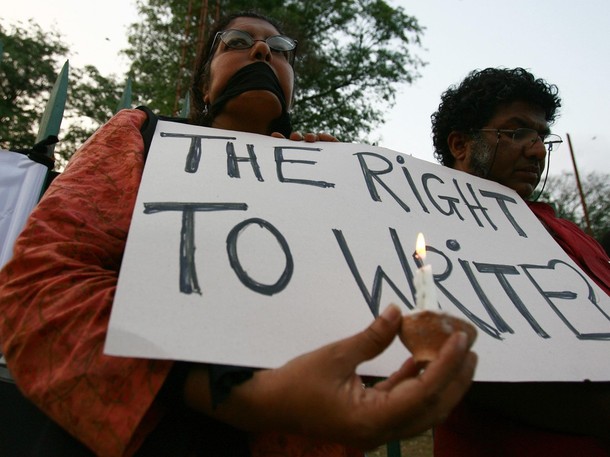
Click here to read CPJ's new report In Sri Lanka
By Bob Dietz - CPJ has launched a new report, In Sri Lanka, No Peace Dividend for Press. It takes a close look at the media in Sri Lanka, one year after the government declared a decisive victory over Tamil secessionists that ended 30 years of bitter, often genuinely suicidal ethnic conflict.
In the years running up to that victory, Sri Lankan journalists who had dared to criticize the government found themselves under serious attack - ten have been killed for their work in the last decade, and many others have been harassed, arbitrarily jailed, temporarily "disappeared," or otherwise seriously harassed. The atmosphere has become so poisonous for journalists that CPJ counts more than 25 in exile. Some of them have asked for, and received, political asylum.
Sri Lanka is one of the oldest democracies in Asia, has never had a military government, and has a popularly re-elected president and parliament brought to power in elections that have been accepted by the international community. In January, incumbent President Mahinda Rajapaksa took 58 percent of the popular vote. In April, his coalition won 144 of the parliament's 225 seats. While he might not have been handed the two-thirds majority he wanted to pass, wholesale, the constitutional amendments to allow him to run gain for a third term, nstead of seeing a president emerging with a firm grip on power, his critics see a leader with a potential stranglehold on the country's political growth.
At a point in the country's history where it should be poised to emerge from that chaos and move toward a period of reconciliation and rebuilding, Sri Lanka's future seems clouded, not least because of the government's attitude toward the media, or at least the part of the media that dares to criticize it.
A few cases in point:
Prageeth Ekanaliyagoda, a mild mannered but anti-government online columnist and cartoonist whose wife and two sons have not seen him since the evening of January 24, has simply dropped out of sight. His wife Sandhya has not been able to get police to even investigate his disappearance, her letters to the president, justice minister, and members of parliament all go unanswered. His editor at Lanka eNews, Sandurawan Senadheera, has fled the country.
Lasantha Wickramatunga, editor in chief of the popular but, again, anti-government Sunday Leader, was killed in broad daylight in January 2009, on his way to work, at rush hour on a busy street. The magistrate's hearings dragged on for a year, and then got interesting when the government suddenly implicated a political opponent -- former general Sarath Fonseka, who fought and won the war with the Tamils.
Despite a call for them to return home and work out a reconciliation made by Attorney General Mohan Peiris, not one of those journalists in exile has dared to risk the return. The cases of Prageeth Ekanaliyagoda and Lasantha Wickramatunga hang too heavily in the air for them to take the chance.
And those exiles know that those cases are not anomalies: This year, Sri Lanka ranked fourth on CPJ's Global Impunity Index. Ten journalists have been murdered over the last decade for covering the war, human rights, politics, military affairs, and corruption. There hasn't been a single conviction in any of those cases.
On May 3, World Press Freedom Day, under political pressure from the European Union, the government announced that it would grant one of the international banner cases of targeted media, J.S. Tissainayagam a presidential pardon, one that hasn't materialized so far. Tissainayagam was released on bail in January and has lived in seclusion since. The Tamil editor was first jailed in March 2008 and eventually indicted under the Prevention of Terrorism Act in August 2008.
Sri Lanka faces a brutal economic slap from the EU in August, when the preferential tariff agreement it enjoys with European countries allowing for the export of clothing and textiles to the EU at preferential rates will be rescinded. Called GSP+, the agreement includes a broad range of human rights conditions, which the EU decided in October 2009 were not being met. If GSP+ is ended, it could knock as much as 2 percent off of Sri Lanka's GDP and push hundreds of thousands of workers out of factories. That sort of economic imperative seems to be the only way to get the government to address its human rights failures, many of them tied to Sri Lanka's thirty years of internal bloodshed, sad history of ethnic conflict will take generations time to redress.
Those failures are certainly greater than just its abuse of journalists. but the Sri Lanka under President Rajapaksa could begin to reverse the country's course by addressing the unprosecuted killings of journalists, and create an atmosphere in which those of them who have fled their homeland to save their lives felt like they could return to their families and jobs in safety.
Bob Dietz is the Asia Program Coordinator for the Committee to Protect Journalists.
© The Huffington Post
Tuesday, May 25, 2010
Sri Lanka and its journalists : A country going wrong
Tuesday, May 25, 2010
Sri Lanka: Relatives of the disappeared protest
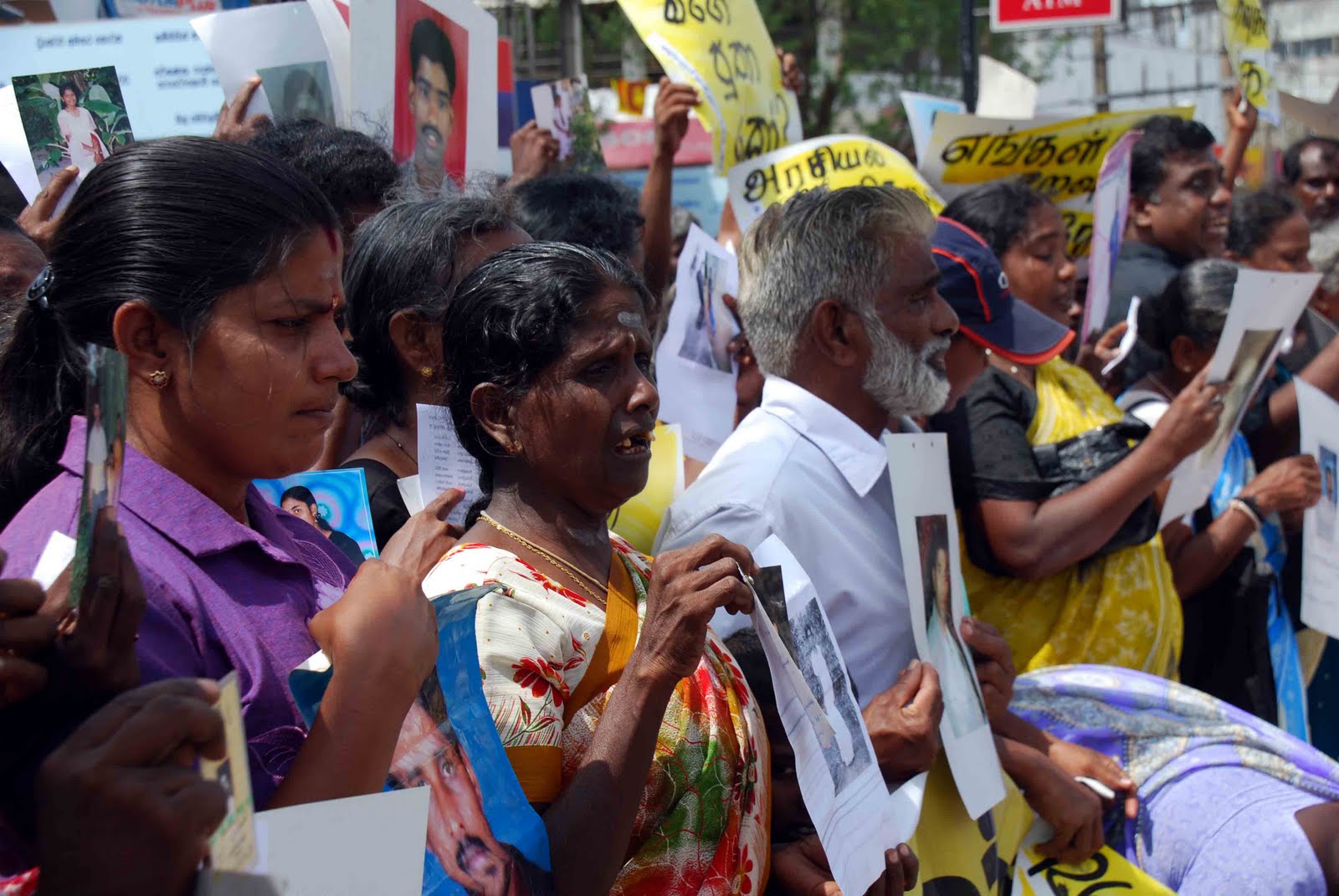
Many people have been disappeared in Sri Lanka since the end of the conflict with the Tamil Tigers, human rights activists say.
Convenor of Committee for the Investigation of Disappearances (CID) Chamil Jayanetti told BBC Sandeshaya that the government should reveal the names of nearly 12,000 suspected LTTE members currently detained.
"We don't know what the fate of these disappeared people are. They may be detained, killed of disappeared. If the government announce the names of those detained then the relatives would have a clue," he said.
Mr. Jayanetti was commenting as a group of relatives of the disappeared protested in Vavuniya, displaying the photographs of the victims, calling for the authorities to reveal what happened to their loved ones.
"My husband was kidnapped when he went to the shop. The people at the shop said they didn't know who the kidnappers were," a woman said.
Another woman said: "He was taken when he was on his way to the temple. We don't know whether he is still alive or dead."
Former Jaffna parliamentarian MK Sivajilingam who attended the protest said that the government should come under international pressure as a result of similar protests.
© BBC Sinhala
Tuesday, May 25, 2010
Is the U.N. complicit in Sri Lankan war crimes?
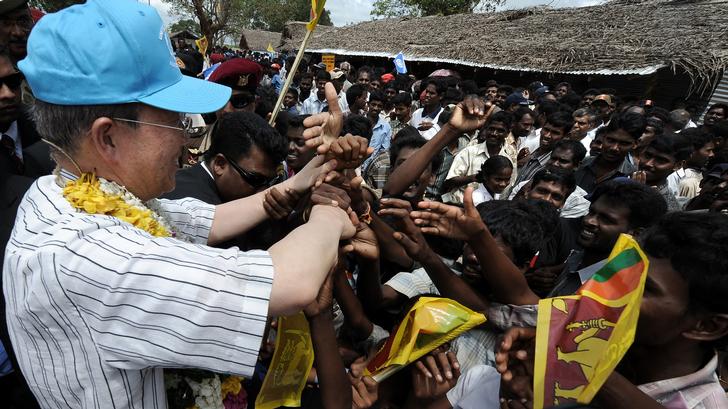
By Colum Lynch - Louise Arbour, the head of the International Crisis Group, called for an internal review of the U.N.'s conduct during Sri Lanka's bloody 2009 civil war, telling Turtle Bay that the organization's abandonment of national staff in a conflict zone and its failure to speak up more forcefully about abuses made it "close to complicit" in government atrocities.
Arbour said the United Nations compromised its principles for a lofty goal: to preserve the ability of aid workers to provide humanitarian assistance to those in desperate need of it. But she faulted the U.N.'s acceptance of "absolutely unacceptable" visa limitations on international staff and the U.N.'s decision to withdraw foreign staff from the northern Sri Lanka province of Vanni in September 2008, on the eve of government forces' final offensive against the rebel Liberation Tigers of Tamil Eelam, leaving behind "very exposed" local Sri Lankan employees.
Her organization also cited one case from June 2009 in which the United Nations "was slow to react" to the abduction and torture of two U.N. national staff members who were detained on suspicion of collaborating with the Tamil Tigers, and "made no serious protest at their mistreatment."
"The U.N. should look at how it behaved in the whole episode," said Arbour, a former U.N. war crimes prosecutor and U.N. High Commissioner for Human Rights. "I think it's a very sobering moment where the United Nations should reexamine the price it is willing to pay to maintain humanitarian access."
In a press conference Monday, U.N. Secretary-General Ban Ki-moon responded angrily to suggestions that the U.N. shared responsibility for the violence. "I totally reject those allegations." He said he would move forward with the establishment of a panel of advisors to counsel him on how to hold perpetrators accountable for crimes during the decisive final months of the decades-long war.
Arbour's remarks follow the release last week of a report by her organization alleging that the Sri Lankan military may have killed more than 30,000 civilians during its 2009 military conquest of the country's Tamil rebels. The report also alleges that the Tamil Tigers, one of the world's most brutal insurgent movements, also committed massive war crimes, forcing hundreds of thousands of civilians to serve as human shields, and murdering those who sought to flee to safety.
Arbour called for an independent investigation into war crimes by both government forces and the Tamil Tigers, warning that lingering bitterness fueled by the conflict will serve as an inspiration to future insurgents. She also faulted the U.N. Security Council for failing to use its powers to constrain Sri Lanka, and the Human Rights Council for issuing a statement praising the government at the end of the conflict for defeating one of the world's most ruthless insurgencies.
"U.N. agencies allowed themselves to be bullied by the government and accepted a reduced role in protecting civilians, most notably with their quick acceptance of the government's September 2008 order to remove all staff from the Vanni," the ICG report stated. "The Human Rights Council chose not to defend humanitarian law, but instead passed a resolution praising the conduct of the government. All of this has eroded further the standing of the U.N. in Sri Lanka and elsewhere."
Arbour's views hold particular weight at the United Nations, where she served in Ban's cabinet and worked alongside many of the officials she is now criticizing. Her remarks echoed her contribution to a 1990s debate on the U.N.'s role in war crimes in Bosnia and Rwanda.
The U.N. is "not a gigantic evil machine but I think there were probably some who made judgment calls that were overly cautious or prudent," Arbour said. "My own suspicion, knowing some of the players in the environment, is it's always for a good reason. It's always not to aggravate the government or make sure they can stay in the game as long as possible. That's exactly why it's so important to look at the facts and start asking are we getting to a point where we are almost complicit with the government in our desire to maintain the delivery of services."
For Arbour, the Sri Lankan war constitutes a defining moment for the United Nations and for Secretary-General Ban, who has faced criticism from rights groups for failing to push earlier for an outside investigation into possible war crimes during the conflict. Arbour said while she welcomed Ban's plan's to set to a panel of experts to explore how perpetrators might be held accountable, she wished he had done so immediately after the conflict.
She also criticized Ban for meeting with President Mahinda Rajapaksa of Sri Lanka and failing to press for an independent investigation. Ban traveled to Sri Lanka after the conflict ended and signed an agreement with the Sri Lankan leader that placed responsibility for ensuring accountability for war crimes with the Sri Lankan government. The deal was struck just as the U.N.'s high commissioner for human rights, Navi Pillay, was pressing the Human Rights Council to establish an independent inquiry into war crimes in Sri Lanka.
"The fact that the secretary-general went and stood with the president at the very end of the war when some of us had been for months screaming about what was happening in Sri Lanka -- I don't want to say it was disappointing," Arbour said. "Well, let's put it this way: I would have preferred an immediate call for accountability. I wish that what we're talking about now was a conversation that had taken place this time last year, immediately after the conflict."
U.N. officials defended Ban's response to the crisis, saying he publicly urged, and worked tirelessly to persuade, Rajapaska and the insurgents to observe a pause in fighting to allow the release of hundreds of thousands of civilians trapped between the warring camps. They say that the U.N. is frequently required to rely on local staff to deliver assistance as a last resort, noting that they have done so in Afghanistan, Iraq, Somalia and other conflict zones.
"The U.N. actually supplied the people with humanitarian assistance, at great risk to its staff," said Nicholas Haysom, Ban's political advisor. "There are times when, on grounds of safety, you have to make tough calls about whether and when to remove international staff, or even national staff, and yet how to continue to deliver humanitarian aid, and we've had to do this in Afghanistan and Pakistan."
Haysom said that Ban was among the "most vocal" leaders in the international community raising the alarm about events unfolding in Sri Lanka. "He was one of the first to do so."
U.N. diplomats and observers said that Ban was raising concerns about the violence, both publicly and privately, but admitted that his heavy reliance on quiet diplomacy had little impact on Sri Lanka's behavior.
"He put a spotlight on what was happening in Sri Lanka," said John Sawers, who was then Britain's U.N. ambassador. "So it's not perfect in Sri Lanka; far too many civilians got killed and there is still an outstanding problem with the civilians in the [Internally Displaced Persons] camps. But I believe Ban's engagement made the situation less bad than it would otherwise have been."
Hasyom said the secretary-general has little power to enforce his views on a sovereign government, particularly when he doesn't have the full backing of the Security Council. "If the council is not backing you, you only have so much independent leverage or power."
Arbour said that the failure to confront the excesses of the Sri Lankan conflict now may lead to further abuses later. The so-called Sri Lanka option -- brutal military counterinsurgency combined with a total disregard for the laws of wars or international condemnation -- has been gaining currency in countries faced with threats from insurgencies or militants. Her agency cited reports that the Sri Lanka option has seeped into the political debates in countries dealing with militants or insurgents, including Burma, Colombia, India, Israel, Myanmar, Nepal, Pakistan, the Philippines, and Thailand.
"I understand the rationale," Arbour said, referring to the U.N. decision to maintain its humanitarian operations in the face of compromises. "It's the only way we're going to get humanitarian deliveries," said Arbour, noting that Sri Lanka should prompt a full reevaluation of U.N. humanitarian policies. "But there must come a point where you really have to ask: Are you now paying a price that is so high that you become almost complicit in terrible actions by governments?"
© Foreign Policy
Tuesday, May 25, 2010
Evicting poor in Colombo: Defence Ministry's new role
On the 8th of May, the Sri Lankan defence ministry deployed police and the army to evict 45 families from central Colombo and demolish their houses. Over recent days, police also have been mobilised to remove thousands of street hawkers in Colombo and its suburbs, in Kandy in the central hills and in the southern city of Galle.
Hundreds of people at Mews Street in Colombo’s Slave Island area were confronted by police officers, including the riot squad, who had been mobilised to evict them. The families’ houses were located beside a school for the children of military personnel. When people refused to leave their homes, police dragged them away. Soldiers were deployed around the area. Bulldozers were brought in and started demolishing houses while local people looked on.
When residents refused to leave the area, arguing that they had a legal right to housing, police riot squad members brutally beat them with batons and chased them away. Army personnel deleted photographs of the bashings from journalists’ cameras.
These attacks are a part of the re-elected government’s broader plans to evict the poor from the country’s main cities and release the real estate for big business developers. Just a few days after the new government was established following last month’s general election, President Mahinda Rajapakse placed the Urban Development Authority (UDA) under the control of the defence ministry. Defence secretary Gotabhaya Rajapakse, the president’s brother, has been appointed UDA chairman.
Placing the defence ministry in charge of urban development marks a further militarisation of Sri Lankan society. It is another demonstration that the repressive military methods used against the Tamil population in the north and east during the war against the separatist Liberation Tigers of Tamil Eelam (LTTE) will increasingly be unleashed against working people throughout the island.
Successive governments tried on a number of occasions since 1977 to remove Colombo’s street vendors but backed away in the face of opposition. By placing the cities under the defence ministry, the government hopes to utilise the security machine built up during the war to forcibly clear the poor from areas it has earmarked for corporate ventures.
The government has planned several projects in major cities, including Colombo, to attract foreign investment and tourists. According to the UDA, Colombo will become the “Core Area” and will dominate in “port-related activities, banking, financial and insurance sectors” on the basis of a “revised zoning plan”. The government is planning to relocate administrative offices in Sri Jayewardenepura-Kotte, nearly five kilometres from the Colombo city centre. Existing industries in Colombo will be located in free trade zones away from the city.
Gotabhaya Rajapakse declared the government’s wider intention to remove street hawkers and demolish the houses of the poor while touring the former northern war zone last week. He told the media in northern Kilinochchi that slums and other “illegal structures” were “eyesores” and would be removed from Colombo. The occupants would be provided with new houses to make the city attractive to the tourists, the defence secretary claimed.
According to government statistics, nearly 54 percent of Colombo’s residents are slum dwellers. They occupy nearly 1,000 acres of prime land “illegally”. Authorities have accused the poor of draining the resources of the city and causing “serious nuisance to citizens and impeding development”.
To justify the removal of Colombo’s pavement vendors, the government and the media claimed the action was pedestrian-friendly and necessary to eliminate crime. Friday’s editorial in the state-owned Daily News commended Gotabhaya Rajapakse for his “no nonsense” stand of rejecting “the pleas of politicians on behalf of these criminals and ordering all unauthorised structures be removed”.
When WSWS reporters visited Slave Island yesterday, hundreds of people remained there on the roads or in near-by buildings. Police personnel had been deployed, and army troops stationed at the junction. Residents angrily recounted that the UDA had called them a week ago and announced that their houses would be demolished on May 8.
One resident explained: “Many of us earn a living as street hawkers. We were asked to go to temporary huts about 4 kilometres away. There are no toilets there and the huts are not suitable for living. A UDA official said they had orders from ‘higher up’ to demolish our houses.
“I think this area is being cleared for the defence school. We were given 5,000 rupees (about $US45). But we refused to take that money. They say these buildings have been constructed illegally. That is a lie. Our people have lived here for about 80 years. We have legal documents.”
Another resident said: “The defence secretary has started this. This is only the first step.” He asked: “Is this the ‘wonder in the Asia’?”—referring to President Rajapakse’s claim to make Sri Lanka an economic wonder in Asia. He added: “Here Sinhala, Muslim and Tamil people were living peacefully. Is this the way the poor are treated by this government?”
A schoolboy told us: “Yesterday I saw tractors come and break our houses. I can’t go to school for months. My school bag and uniforms are under the debris. My sister is facing the same situation. I am crying, and my mother is also crying. Don’t demolish my mother’s and grandmother’s house!”
Many street hawkers expressed their outrage. One declared: “How can we live without our businesses? How will our children eat and go school? This is very unjust. We need a fair solution. Most pavement vendors supported the government in the elections, but since winning the elections the government doesn’t care about us.”
Amid rising anger, President Rajapakse held a meeting with a delegation from the payment hawkers’ association in Colombo’s Pettah area on May 4. He promised land in the area for 1,000 small stalls and offered to pay 2,000 rupees per day to vendors for two weeks until the construction was completed. Street hawkers do not trust this face-saving move, and fear that they will be eventually evicted from the new area as well.
There are about 20,000 hawkers in Colombo alone, drawn from the poorest sectors of the country’s population, including the rural poor and plantation families. Some of them have been engaged in their small businesses for decades.
Sugath and his father Piyasiri have been selling clothes in front of Colombo’s Fort Railway Station for more than 15 years, since arriving from Midigama village near the southern city of Matara. Sugath thought that the cleared area would be allocated to government supporters.
He said: “My uncle’s son also works as a pavement vendor. I have three children, all in school. Without doing our job, how can we feed our children? We don’t know any other job.”
Vendors contemptuously recalled the government’s election promises. One declared: “We are poor people. During the election, the government said that if it won, it would not forget us. But what has happened now? We have been pushed into the underworld.”
A vendor selling clothes in Borella, another Colombo neighbourhood, said he was taking a risk after the vendors were chased away because he had no other means to live. He added: “I have to send my children to school. The cost of living is very high. I spend 300 rupees for my daily meals. We earn different income each day, but it is just enough to live. We don’t have enough money to buy goods to sell, so we borrow money and have to pay high interest daily. The government decision is very unfair.”
The government’s offensive against the poor must be taken as a warning to the entire working class. Working people will be treated in the same brutal manner when they resist the austerity measures that the government is currently drawing up to meet the terms of last year’s $US2.6 billion loan from the International Monetary Fund.
© Socialist Equality
Tuesday, May 25, 2010
Sri Lanka: Floods recede, affected continue to suffer
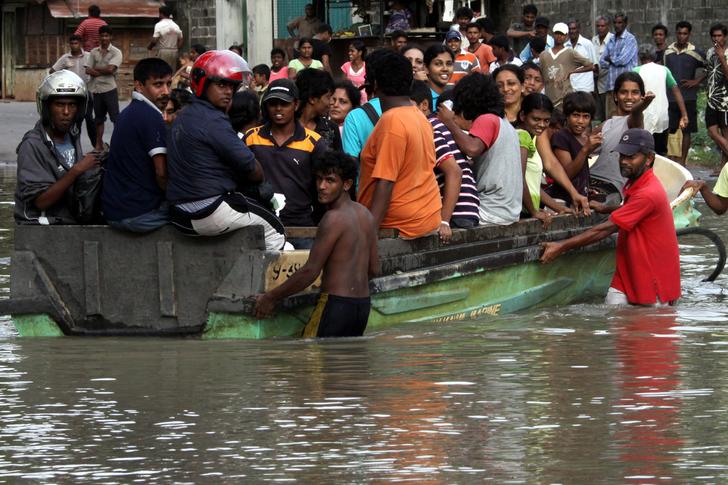
By Ishtartha Wellaboda - The torrential rains and the ensuing floods have now begun to recede, but those affected in the disaster continue to suffer.
According to the Disaster Management Centre 20 lives were claimed during last week’s rains and floods, while 546,247 others were affected by the floods.
Meanwhile, 15,361 people have been displaced with their houses being washed away. Currently, the displaced are being facilitated at 78 centres around the country. The DMC also reports that 493 houses were fully destroyed by the floods while another 2,496 houses had barely survived.
Though it was reported that Hurricane Laila passed from the Bay of Bengal towards India, DMC reports that the hurricane’s effects caused some damage to property and people in the Jaffna Peninsula. The effects of the Hurricane destroyed 27 houses in Jaffna while causing damage to another 524 houses. Over 2,216 people in Jaffna were affected by the hurricane.
Gampaha District appears to be the worst struck area due to floods with eight deaths and 193,330 people affected. Colombo District is the second worst affected area. Though no deaths were reported 153,342 people in the district were affected by floods.
Two families in the Kothmale area in Nuwara Eliya and a family in Dehiowita were also harmed by landslides. However, no one had sustained any serious injuries. Meanwhile, two people were killed by drowning in flood water in Habaraduwa and Elpitiya.
© The Nation
Tuesday, May 25, 2010
Rs. 202,220 mil for Sri Lanka's defence in 2010
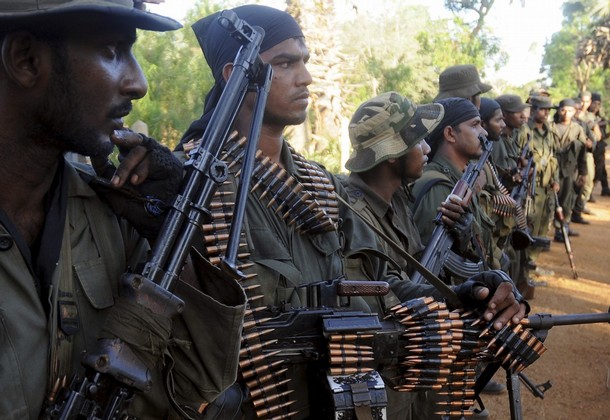
According to the appropriation bill for 2010, the highest allocation continues to be reserved for the Ministry of Defence.
With recurring expenditure amounting to Rs. 191,290 m and Rs. 10,930 as capital expenditure, the total expenditure stands at Rs. Rs. 202,220 m.
The second largest allocation, Rs. 113,260 m, is reserved for the Ministry of Provincial Councils and Local Government.
© Colombo Today
Tuesday, May 25, 2010
Sri Lanka: Kokilai nature reserve 'bulldozed'

A nature reserve in north eastern Sri Lanka is being bulldozed for development and for resettlement after the war, environmentalists say.
Sri Lanka Nature Forum (SLNF), said that over 40 acres of Kokilai nature reserve has been bulldozed during April-May this year.
"It is sad that authorities keep quiet and many environmental problems will emerge as a result of this destruction in an area which is home to herd of 35 elephants," it said.
It warned that the large parts of Kokilai lagoon might soon be filled as a result of this destructive action.
The wetlands surrounding Kokilai lagoon is the habitat of hundreds of birds including migrants. The lagoon itself is renown for its marine life.
SLNF Project Manager Sajeewa Chamikara who recently visited Kokilai told BBC Sandeshaya that a huge area with mangroves was affected by the bulldozing.
"The area adjacent to the bulldozed nature reserve is also destroyed by the fire" he said.
He added that the government has failed to appoint either forestry or wildlife authorities to look after the nature reserve in the north.
However, Resettlement Minister Milroy Fernando told BBC Sandeshaya that government has no need to destroy a nature reserve to resettle war displaced.
"It is not done by the government," he said.
The minister pledged to investigate the accusations when he visit the north on Monday.
© BBC Sinhala
Tuesday, May 25, 2010
Probe war crimes in Sri Lanka: Boston Globe Editorial
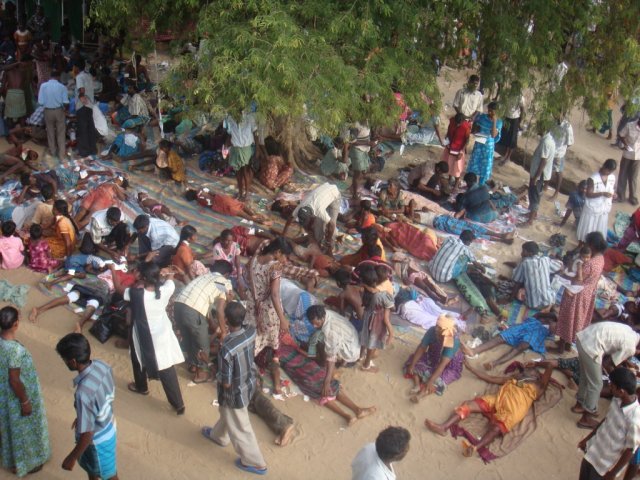
At this time last May, the Sri Lankan government of President Mahinda Rajapaksa declared total victory over the secessionist Tamil Tigers. Since then, the outside world has received credible accounts of war crimes perpetrated on a large scale by Sri Lankan security forces as well as by the Tigers. Human rights groups are now calling on the United Nations to authorize an international investigation of humanitarian law violations in Sri Lanka. President Obama, who has drawn criticism for soft-pedaling human rights concerns in Africa, the Middle East, and elsewhere, should insist that Sri Lanka’s government be held accountable for shelling civilians and hospitals and murdering fighters who surrendered on the battlefield.
The case for an international inquiry is not based solely on an abstract ideal of justice. If there is impunity for the horrors inflicted on civilians in Sri Lanka, other states confronting civil wars or secessionist rebellions will assume there is no price to pay for copying the Sri Lankan blueprint. This is a formula for scorched-earth repression, banning the international press, denying all charges of misconduct, and pretending the killers can conduct a disinterested investigation of their killings.
Sri Lanka needs a peaceful way to move beyond its ethnic tensions. While the country’s Tamil minority has legitimate grievances, the tactics of the Tamil Tigers were often brutal. The Sri Lankan government showed a willingness to take draconian steps to defeat the separatists. Beyond serving the cause of justice, an international war crimes inquiry may also promote a reconciliation between the Rajapaksa government and the minority Tamils of that island nation.
© Boston Globe
Tuesday, May 25, 2010
Sri Lanka: War crimes defense tour begins behind closed doors

By Matthew Russell Lee - Sri Lanka's war crimes defense tour has begun. Sunday evening in Manhattan's Waldorf Astoria hotel, new Minister of External Affairs G.L. Peiris held interviews with selected reporters in the presence of the country's Permanent Representative to the UN, Palitha Kohona.
One reporter upon leaving his interview with Peiris told Inner City Press, "Well, he made his defense."
Often when foreign ministers or even heads of state come to the UN in New York, they hold press conferences open to all media. At such recent events, Inner City Press has put questions as simply two examples to Iran's Mahmoud Ahmadinejad, and Georgia's foreign minister. Perhaps, some wondered, G.L. Peiris is not ready for prime time?
Despite having covered Sri Lanka more closely than any other correspondent at the UN for the last two years, when Inner City made a formal request to the Sri Lankan Mission, then directly to Palitha Kohona, to pose questions to Minister Peiris, the requests were neither granted nor even responded to.
Rather, several journalists who have never written about Sri Lanka much less seen the internment camps at Vavuniya were invited, some to be wined and dined and told that all is well in Sri Lanka. There is more to be said on this.
Peiris is slated to meet with UN Secretary General on May 24, then fly to Washington. He will meet with Secretary of State Hillary Clinton. He will also meet, in New York or Washington, with US Permanent Representative to the UN Susan Rice.
When Inner City Press sought clarification from the US Mission of Ambassador Rice's praise of Mahinda Rajapaksa's "Lessons Learnt and Reconciliation Commission" which includes his Kohona's predecessor Ambassador Palihakkara, who defended the "bloodbath on the beach" in real time, none was received for two days, until Inner City Press managed to ask the question at a stake out.
In the interim, Inner City Press had sought clarification from Assistant Secretary of State Robert Blake. We can now report that his office called back and said he declined to speak on the matter, to continue to seek answers either from "US UN" -- the Mission -- or the State Department's war crimes office. Watch this space.
© Inner City Press
Tuesday, May 25, 2010
Mixed response to Sri Lankan panel

By B. Muralidhar Reddy - The decision of Sri Lankan President Mahinda Rajapaksa last week to appoint an eight-member Lessons Learnt and Reconciliation Commission on the the events ranging from the aborted ceasefire pact in 2002 to the military defeat of the LTTE in May last year has evoked mixed reaction.
While the government has said the Commission could provide the much-needed healing touch in the post-war nation, a section of the activists within and outside Sri Lanka have expressed reservations on its effectiveness.
The announcement has coincided with the first anniversary of the military defeat of the LTTE and followed demands from some quarters for an impartial inquiry particularly on the last phase of the conflict. IRIN, a news agency which functions under the aegis of the United Nations, in a report quoting local activists in a report, said the Commission might not complete its mandate to investigate events during the last phase of a civil war between 2002 and 2009 — claiming that several short-lived commissions in the past two decades have failed.
There has been a big gap between the words and deeds of the government where it concerns issues of human rights, good governance and accountability,” Jehan Perera, director of the National Peace Council, an NGO in Colombo, told IRIN.
The mandate of the Commission announced on May 17 is to report on the lessons to be learnt from the events from Feb 2002 to May 2009, their attendant concerns and to recommend measures to ensure that there will be no recurrence of such a situation. It has been asked to ascertain whether any person, group or institution directly or indirectly bears responsibility for the events and report on measures to be taken to prevent the recurrence of such concerns to promote national unity and reconciliation among all communities.
© The Hindu
This site is best viewed with firefox

Search
Is this evidence of 'war crimes' in Sri Lanka?
Archive
-
▼
2010
(1312)
-
▼
May
(106)
-
▼
May 25
(10)
- Mixed response to Sri Lankan panel
- Sri Lanka: War crimes defense tour begins behind c...
- Probe war crimes in Sri Lanka: Boston Globe Editorial
- Sri Lanka: Kokilai nature reserve 'bulldozed'
- Rs. 202,220 mil for Sri Lanka's defence in 2010
- Sri Lanka: Floods recede, affected continue to suffer
- Evicting poor in Colombo: Defence Ministry's new role
- Is the U.N. complicit in Sri Lankan war crimes?
- Sri Lanka: Relatives of the disappeared protest
- Sri Lanka and its journalists : A country going wrong
-
▼
May 25
(10)
-
▼
May
(106)
- ► 2011 (687)
Links
- Reporters Sans Frontières
- Media Legal Defence Initiative
- International Press Institute
- International News Safety Institute
- International Media Support
- International Freedom of Expression eXchange
- International Federation of Journalists
- Committee to Protect Journalists
- Asian Human Rights Commission
- Amnesty International
![Reblog this post [with Zemanta]](http://img.zemanta.com/reblog_e.png?x-id=9e8e757e-5131-4598-91ca-0420a6ed3f37)
![Reblog this post [with Zemanta]](http://img.zemanta.com/reblog_e.png?x-id=bdeace99-aaa5-437f-8041-ad7cf22627b1)
![Reblog this post [with Zemanta]](http://img.zemanta.com/reblog_e.png?x-id=51bcbe8c-84c7-4873-939f-3cd24c93273f)
![Reblog this post [with Zemanta]](http://img.zemanta.com/reblog_e.png?x-id=629abadd-1be6-4ad1-93da-7413fd932bce)
![Reblog this post [with Zemanta]](http://img.zemanta.com/reblog_e.png?x-id=efb0c4bc-80ee-4972-b698-31539c92758a)
![Reblog this post [with Zemanta]](http://img.zemanta.com/reblog_e.png?x-id=bc410560-2306-4b24-8f20-8d4e094e135c)
![Reblog this post [with Zemanta]](http://img.zemanta.com/reblog_e.png?x-id=f7beecbf-4f5d-4f64-82b1-fcbfb3a76056)
![Reblog this post [with Zemanta]](http://img.zemanta.com/reblog_e.png?x-id=429dea3e-c9ef-42e8-8fc9-bed81e0dacdb)
![Reblog this post [with Zemanta]](http://img.zemanta.com/reblog_e.png?x-id=c3f18d3e-ead2-4b15-ac25-a48f51f9b1f6)
![Reblog this post [with Zemanta]](http://img.zemanta.com/reblog_e.png?x-id=a02b4e88-ed2a-4e0e-a88b-029ee88f1e8e)















